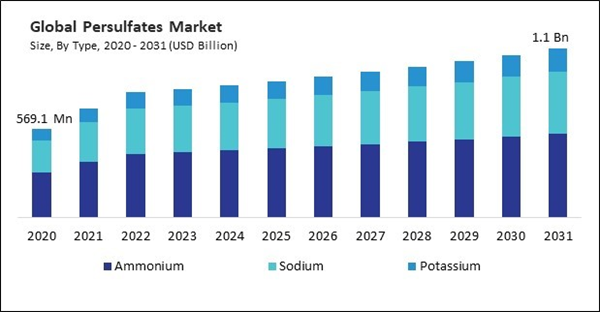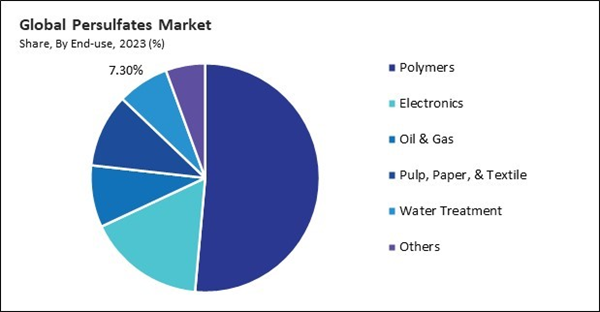These chemicals, such as sodium and ammonium, are commonly used as bleaching agents in the pulp, paper, and textile industries. Consequently, the pulp, paper, & textile segment would acquire nearly, 10% of the total market share by 2031. Also, the Russian market would utilize 15.23 hundred tonnes of this chemical in pulp, paper, and textile industries by 2031. In pulp and paper manufacturing, persulfates are utilized in the bleaching process to remove lignin and other impurities from wood pulp, resulting in brighter and whiter paper products. Similarly, in the textile industry, persulfates bleach cotton, linen, and synthetic fibres to achieve desired colour shades and improve fabric aesthetics.
The polymer industry is witnessing robust growth driven by various sectors such as automotive, construction, packaging, electronics, and healthcare. Polymer materials are ubiquitous in everyday products and industrial applications, ranging from plastics and rubber to coatings and adhesives. Moreover, advances in polymer science and technology drive the development of new polymer materials with enhanced properties and functionalities. Hence, increasing demand for polymer initiators is driving the market’s growth. Additionally, Nanotechnology allows for the production of persulfate particles at the nanoscale, resulting in increased surface area and reactivity compared to conventional persulfate particles. Also, nanotechnology enables the design of persulfate-based nanocomposites with selective targeting capabilities for specific contaminants. Thus, rising advancements in nanotechnology are driving the market’s growth.
However, the production of this chemical relies on key raw materials such as sulfuric acid and hydrogen peroxide. Any fluctuations in the prices of these raw materials directly impact the production cost of this chemical. Similarly, unique seasonal or regional factors can exacerbate volatility in raw material prices for persulfate manufacturers. Hence, volatility in raw material prices is impeding the market’s growth.
End-use Outlook
On the basis of end-use, the market is segmented into polymers, electronics, pulp, paper, & textile, oil & gas, water treatment, and others. In 2023, the electronics segment attained a 51.3% revenue share in the market. In terms of volume, the electronics segment registered 491.10 hundred tonnes in 2023. The electronics industry is witnessing trends towards miniaturization, higher component densities, and more complex circuit designs. These trends require advanced PCB fabrication techniques to achieve finer features, tighter tolerances, and higher precision. This chemical offer advantages such as high etching efficiency, excellent selectivity, and compatibility with high-resolution photolithography processes.Type Outlook
Based on type, the market is divided into ammonium, sodium, and potassium. The sodium segment attained a 36% revenue share in the market in 2023. In terms of volume, the sodium segment registered a volume of 1,033.55 hundred tonnes in 2023. Sodium persulfate (SPS) is extensively used in the electronics industry, particularly in printed circuit board (PCB) manufacturing. With the continuous expansion of the electronics industry and increasing demand for electronic devices, the demand for SPS as an etchant for PCBs is also rising.By Regional Outlook
Region-wise, the market is analysed across North America, Europe, Asia Pacific, and LAMEA. In 2023, the Asia Pacific region witnessed 47% revenue share in the market. The Asia-Pacific region is a global hub for electronics manufacturing, with countries like China, South Korea, Taiwan, and Japan major electronic components and devices producers. This chemical are extensively used in the electronics industry for PCB fabrication, semiconductor manufacturing, and surface treatment processes.List of Key Companies Profiled
- Evonik Industries AG (RAG-Stiftung)
- Calibre Chemicals Pvt. Ltd. (Everstone Capital Asia Pte. Ltd.)
- United Initiators GmbH (EQUISTONE PARTNERS EUROPE)
- Mitsubishi Gas Chemical Company, Inc.
- Fujian ZhanHua Chemical Co., Ltd
- Ak-kim Kimya Sanayi ve Ticaret A.Ş (Akkök Holding A.Ş)
- Yatai Electrochemistry Co., Ltd.
- ABC Chemicals(Shanghai)Co., Ltd.
- San Yuan Chemical Co., Ltd.
- Adeka Corporation
Market Report Segmentation
By Type (Volume, Hundred Tonnes, USD Billion, 2020-31)- Ammonium
- Sodium
- Potassium
- Polymers
- Electronics
- Oil & Gas
- Pulp, Paper, & Textile
- Water Treatment
- Others
- North America
- US
- Canada
- Mexico
- Rest of North America
- Europe
- Germany
- UK
- France
- Russia
- Spain
- Italy
- Rest of Europe
- Asia Pacific
- China
- Japan
- India
- South Korea
- Singapore
- Malaysia
- Rest of Asia Pacific
- LAMEA
- Brazil
- Argentina
- UAE
- Saudi Arabia
- South Africa
- Nigeria
- Rest of LAMEA
Table of Contents
Companies Mentioned
- Evonik Industries AG (RAG-Stiftung)
- Calibre Chemicals Pvt. Ltd. (Everstone Capital Asia Pte. Ltd.)
- United Initiators GmbH (EQUISTONE PARTNERS EUROPE)
- Mitsubishi Gas Chemical Company, Inc.
- Fujian ZhanHua Chemical Co., Ltd
- Ak-kim Kimya Sanayi ve Ticaret A.Ş (Akkök Holding A.Ş)
- Yatai Electrochemistry Co., Ltd.
- ABC Chemicals(Shanghai)Co., Ltd.
- San Yuan Chemical Co., Ltd.
- Adeka Corporation










